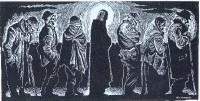| |
Why This Issue
Let me tell you a couple of stories. I was sitti ng in the community room at Karen House with about eight or nine of my fellow Catholic Workers. We were brainstorming what the topic might be for the next Round Table issue. We tossed about several ideas as we always do, seeing what might develop with a particular idea. I realized that it all sounded too familiar to me. Everything sounded the same, like something said or tried a hundred ti mes before. Whenever I spoke, I kept offering
ideas like, “Let’s review the Nobel Prize winners for literature, or our favorite novel.” At the end of the discussion I realized,“I just need to read a novel!” I felt dried out like an old reed. Recently I was sitting somewhere else. I was in the back of St. Cronan’s church at the 5pm Saturday Mass, a Mass I like because it is small and quiet. The reading for the day was one of my favorites, the return of the prodigal son. I was moved as I usually am by this story because it offers hope and reminds us of the great mercy of God.
In his reflection on the reading, Gerry Kleba told us yet another story. During the Reconciliation process after the end of Apartheid in South Africa, there was a particular trial. An older woman, whose son had been killed during the Apartheid, faced the man who had been responsible for his death. Facing him, and in a sense handing down his sentence to him, she said something along these lines,“Since you have taken from me my only son and left me alone, you must now take his place and become my son. You must come to visit me in my old age.” The South African man was given new life when he heard this response, and in hearing it, so was I. The woman’s unexpected greatness of heart made me feel that everything was not old, but young and alive, and that life was full of great possibilities.
The Round Table committ ee kindly responded to my need for inspiration and decided to invite you to submit stories for publicati on here. Included in this issue of The Round Table, therefore, are several of them. Carolyn Griffeth and Tery McNamee have offered several about dumpstering that may make you want to go and check out your local dumpster. Claire Lakey contributed a story of early Catholic Worker days in St. Louis. Ellen Rehg tells of being inspired by two women
in need, Mike Bremer offers an anarchist tale from the south side of Chicago, Angie O’Gorman tells a heartbreaking story about losing God and Allah. Virginia retells her experience being kidnapped by the Contra. Mary Ann McGivern, long-time
RT story-teller tells a story about male resident- yes there once was a man at Karen House- Donald Cress. I pass on my own memory of an early Karen House guest who taught me something about love. J.P. Murray writes a story about the patient
presence and love of a father through the eyes of his son. Rick Mihm literally encourages us with his own tale of courage.
As if stories weren’t enough, we off er several pieces of poetry off ered by St. Louis’ finest, Mark Chmiel, Tina Busch-
Nema, Megan Ramsey, Bill Ramsey and Rebecca Gorley. In place of the regularly featured articles we have two book reviews, one by Colleen Kelly of Angie O’Gorman’s first
novel, The Book of Sins, and one by Ben Schartman on a new book, Contesting Patrioti sm, by long-time Karen House community member, Patrick G. Coy, Lynne M. Woehrle and Gregory M. Maney. Lastly, we offer from Little House by Mike Baldwin and from Karen House by James Meinert.
Stories can give us a new perspective on life and on human possibilities, they can move us, inspire us, and bring back meaning to our own lives when it seems to have slipped away from us. Thanks to all who sent in stories and we hope that they are enjoyed by all.
-Teka Childress |
|


